
* This post is written by a guest blogger - it is not sponsored. *
My name is Jonathan Collins, I am 30 years old and I have a passion for wheelchair fencing. I was only given hours to live at birth, but despite the odds, I am here to tell the tale! I then went on to be diagnosed with Spina Bifida and Hydrocephalus, leaving me unable to stand and dependant on the use of a wheelchair. Because of this, I have endured various medical operations and procedures throughout my life to better manage my condition and improve quality of life. Unfortunately, in 2004 I had an undiagnosed shunt failure and suffered severe sight loss as a result; something that was mentally and physically difficult to accept.
I enjoyed watching sport on the television from a young age, even though I was unable to participate in any sports during school due to the lack of support services available to me. Because of this, I attended many taster sessions over time, but they were always impractical or unappealing. One thing I did learn was that I didn’t want to participate in a team sport where I could let my teammates down; instead, I wanted to take an “individual sport” that relied purely on my own ability. But finding something suitable seemed impossible until I met an old friend by chance in 2012, who had just given up wheelchair fencing due to ill health. They recommended a local fencing club and after checking it out, I was instantly “hooked”.
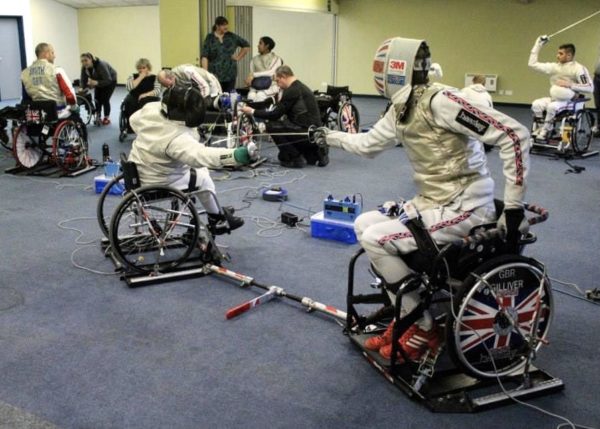
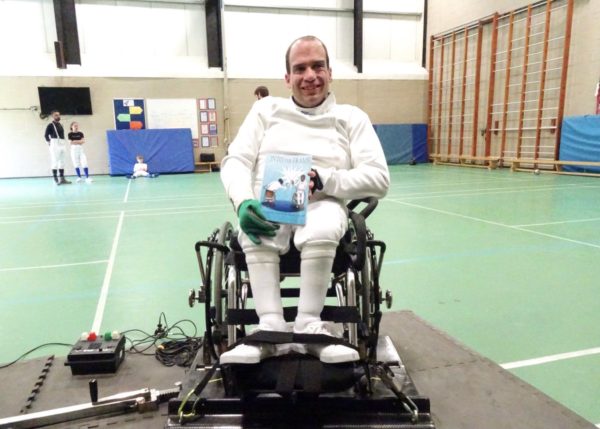
There is no doubt that wheelchair fencing has improved my life in many ways. The intense activity level has made me physically stronger, whereas the constant need to evaluate your game plan has made me more alert and engaged. Plus the adrenaline associated with this sport paired with the opportunity to socialise with other fencers made me a lot happier mentally, which in turn helped my self-esteem to rocket. Participating in the sport has also had a positive impact on my social life, but the coronavirus outbreak has put physical contact with both my coach and other fencers on hold. So at present, I am maintaining my involvement by regularly promoting wheelchair fencing on social media.
There are several factors that keep me motivated and have collectively helped me through the pandemic. My biggest driving force is always the thought of my next training session, even if it means using a target board to practise at home. I also attend some of the GB training camps, which are extremely mentally, physically and socially motivating. It's an experience that pushes you to become better at the sport in every way possible. Finally, my determination to stay connected with the sport during lockdown has provided me with a newfound sense of motivation. I love promoting my passion and appreciate the feedback I've received from around the world, even if it's a brief message from someone who initially never knew anything about wheelchair fencing.
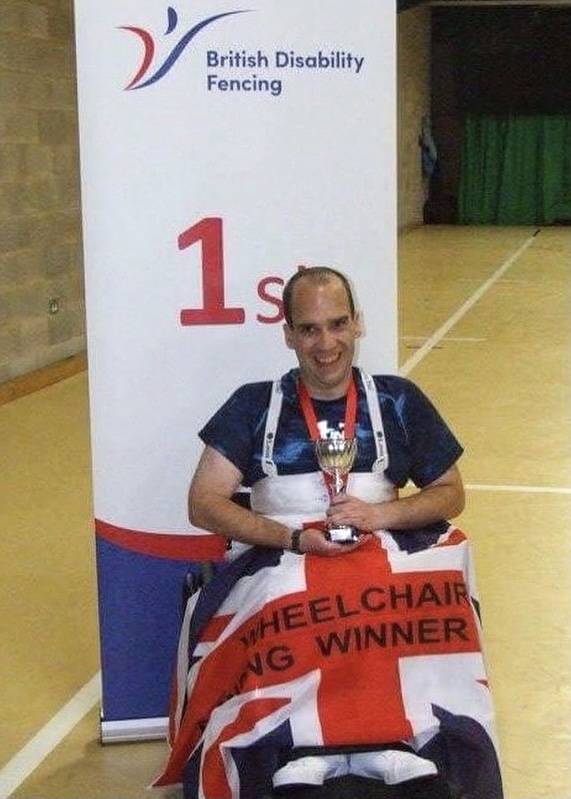
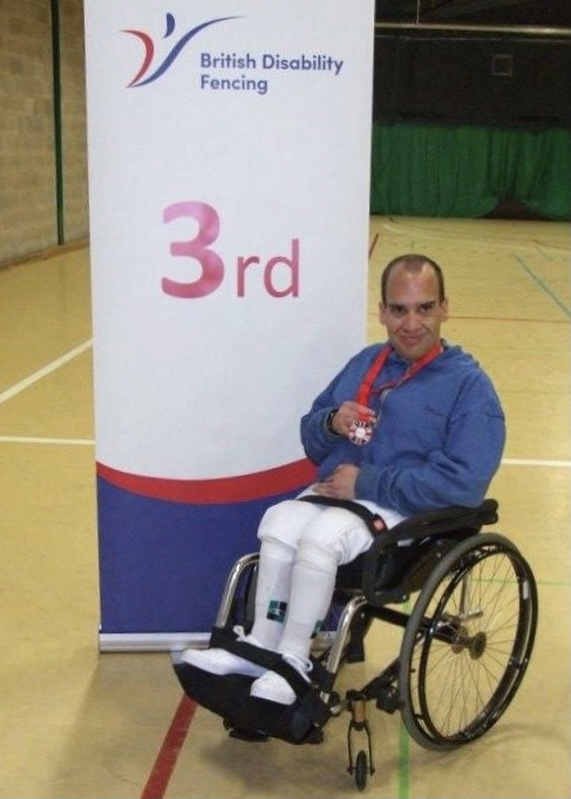
- Wheelchair fencing is not a well-known sport.
- It is surprisingly very similar to the able-bodied version, with only a few adaptions due to the fact participants are seated in a wheelchair.
- All wheelchairs are fixed into a special frame that is then attached to the floor; preventing it from moving around during a game and maximising the participant's safety.
- Unlike some adapted sports, there are different categories based on the severity of the participant's individual needs, meaning wheelchair fencing is compatible with most disabilities.
- Participants are also not required to use a wheelchair full-time to become a wheelchair fencer.
If wheelchair fencing is not to your liking, don't be afraid to try something else. There are numerous sports out there which may be better suited to your physical needs and/or personal preferences. But for anyone interested in learning more, I suggest contacting the governing body for British Disability Fencing. It doesn't matter what disability you have, if you are looking to participate in adaptive sports then I recommend giving wheelchair fencing a try. It is a well-regulated sport with a multitude of high safety procedures in place, so there is no need to be afraid. Once I put on my special clothing and helmet, my wheelchair is in place and the weapon in my hand, I feel alive. It is such an amazing feeling that I would love for others to experience.
WheelPower is the national charity for wheelchair sport with history dating back over 70 years and the work of their founder Professor Sir Ludwig Guttmann, the father of the Paralympic Movement. From their home, Stoke Mandeville Stadium they provide opportunities for disabled people to enjoy sport and physical activity, whilst benefiting both mentally and physically from leading a healthy and more active lifestyle.
WheelPower is at the heart of wheelchair sport in the United Kingdom and they continue to support thousands of disabled people every year through a calendar of sporting events, online exercise resources and funding to support individuals to reach their sporting potential. Find out more by clicking HERE and get involved!
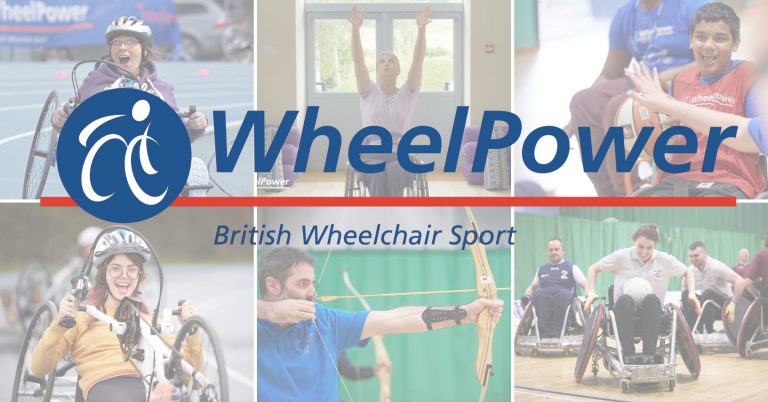

Hi, I'm Lauren and I have been living with a collection of disabilities for the past 8 years. I initially had a passion for teaching children with special needs, but my health prevented me from pursuring my dream career. Despite this, I now love nothing more than sharing my experiences to help other people living with disabilities.
Hi, I’m Lori and was diagnosed with Ehlers Danlos Syndrome and a family of co-morbid conditions which has made life highly complex. However I constantly aim to make life as ‘normal’ and fulfilling as possible - and through this, I discovered the benefits of writing about my journey.
 GET IN TOUCH
GET IN TOUCH


